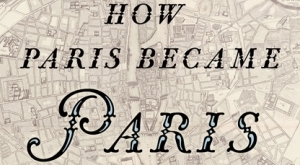At roughly the same time that the Founding Fathers were ringing the bells of revolution on the East Coast, California was nearly empty. It had no cities and only a modest fur-trading economy. It was a land crying out for a story — an empty soundstage, if you will. The role into which Serra grew, according to Steven W. Hackel in Junípero Serra: California’s Founding Father, was that of “a pioneer, a religious icon, and as a colonial imperialist.”
Book Review: ‘How Paris Became Paris’
Anyone who writes about Paris naturally gets to draft off the city’s grandeur, so DeJean has an unfair advantage. Even so, she impressively achieves her goal: to explain Paris—specifically the extraordinary developments of the 1600s—without demystifying it.
The Original Big Digs
The gridlock in American cities today doesn’t compare to the crush on streets in Boston and New York City in the mid- to late-1800s. In The Race Underground, Doug Most chronicles the occasionally synchronous development of the nation’s first subways.
Slow Train to Los Angeles: Book Review of ‘Railtown’
Elkind could have gone down many spur tracks, into grand discussions of the feasibility of rail and lofty, ongoing debates about quality of life, cosmopolitanism, public subsidies, and transportation economics. He does not.
Top 10 Books – 2014
History of Future Cities is either a history book with an incredible urban sensibility or an urban book with an impressive grasp of history.
Smart Growth Literature Hits a Cul-du-Sac
Where is Robert Bruegemann when you need him?
History of Future Cities
Brook contends that the four cities were not built to celebrate their respective cultures or to build indigenous economies but rather to establish beachheads of western modernity on incongruous and otherwise backwards soils.
“Going Solo: The Extraordinary Rise and Surprising Appeal of Living Alone”
Eric Klinenberg’s Going Solo: The Extraordinary Rise and Surprising Appeal of Living Alone offers a potentially instructive glimpse into how the other half lives: some out of preference, others out of desperation.
Book Review: Aerotropolis Promotes Planning Where Land Meets Sky
The somewhat unnerving implication of Aerotropolis is that the great cities of the global age aren’t so much cities but rather are catchment areas for airports — specifically, airports that fling people and goods across oceans.
CP&DR Holiday Book Roundup
Over the past few years, publishers have put out enough books on urban sustainability to make Al Gore blush. Unfortunately, making a city sustainable takes a lot longer than does writing a book about making …
Reclaiming the Interstates from Ike
Just in case you thought that suburbanization of the 20th century was a joint venture between God, the invisible hand, and a pot of gold delivered by the Freedom Fairy, Earl Swift’s Big Roads might …
Planetizen Top 10 Books – 2012
Urban planning’s very own Don Draper has put quantitative analysis to a far more humane use. If Jane Jacobs wrote from the heart, Glaeser writes decidedly from the head.
Book Review: ‘Making the San Fernando Valley’
Early in her account of the development of San Fernando Valley, Laura R. Barraclough describes an 1880s-era photo that captures the wholesome spirit of what would become Los Angeles’ great bedroom community: “Captioned ‘Lankershim’s best …
Book Review: Julius Shulman Los Angeles
Yes, it’s a coffee table book. But, even for urban planning wonks, it reveals more about how the built environment evolves than could a million pages of zoning code.
Every City For Itself: Adapting to Climate Change
A great deal of literature has already anointed the hero in the fight against climate change: the city. Beginning with David Owens’ Green Metropolis and including the work of Paul Hawken, Ed Glaeser, and countless …
Joel Kotkin Anticipates How California Will Handle Its Share Of ‘The Next 100 Million’
In his latest book, The Next 100 Million: America in 2050, Los Angeles-based author and urbanist Joel Kotkin discuses who these 100 million new Americans are going to be, where they are going to live, and what type of lifestyles they will lead.
Histories of No History: Commodification and Urbanization in the American West
Cities do not, generally, sleep with the wrong people. They do not lapse into drug-addled despair or plunge headlong into creative fervor, emerging as sex symbols, dictators, or captains of industry. Reasons, therefore, abound for …



